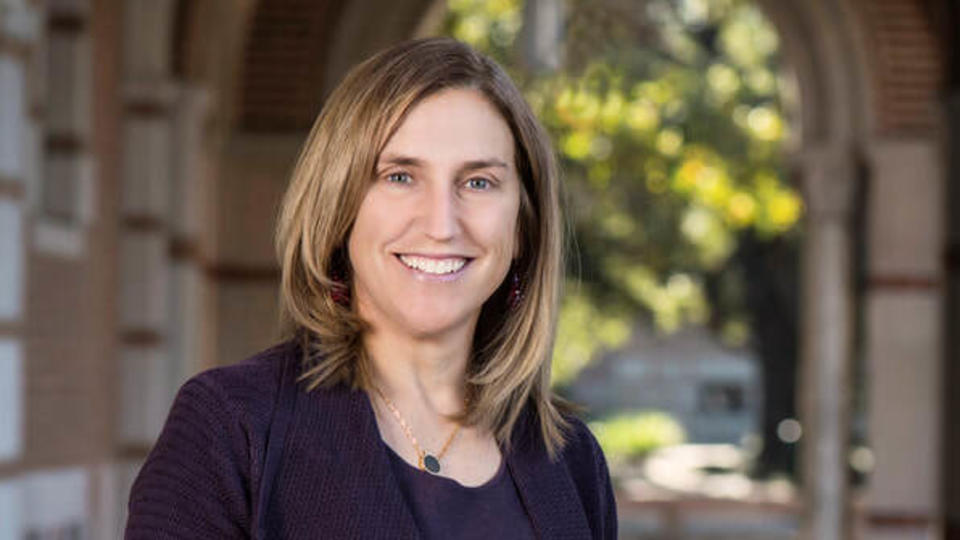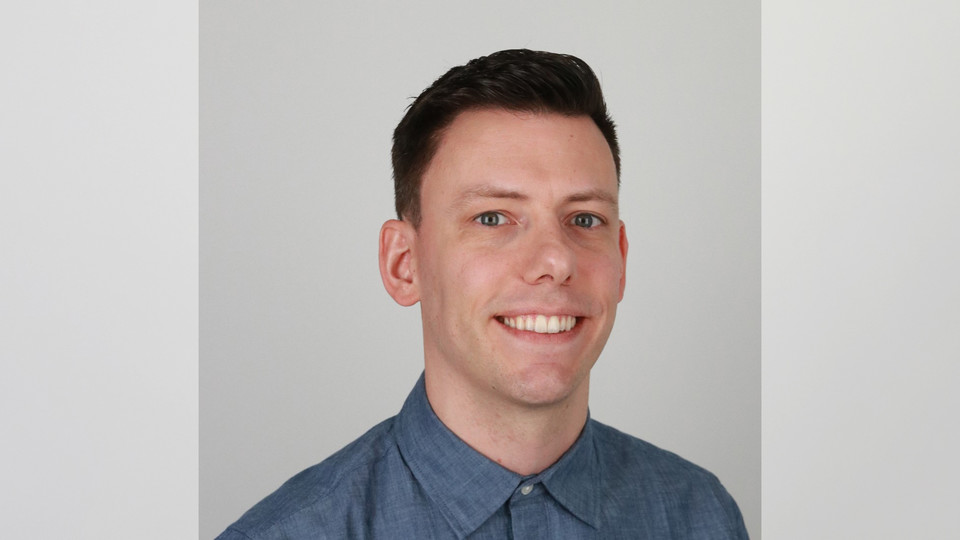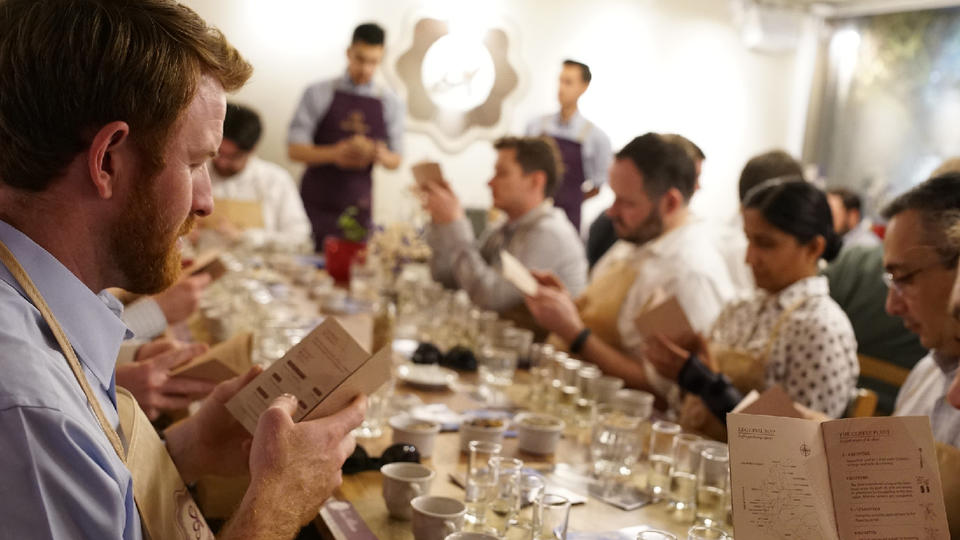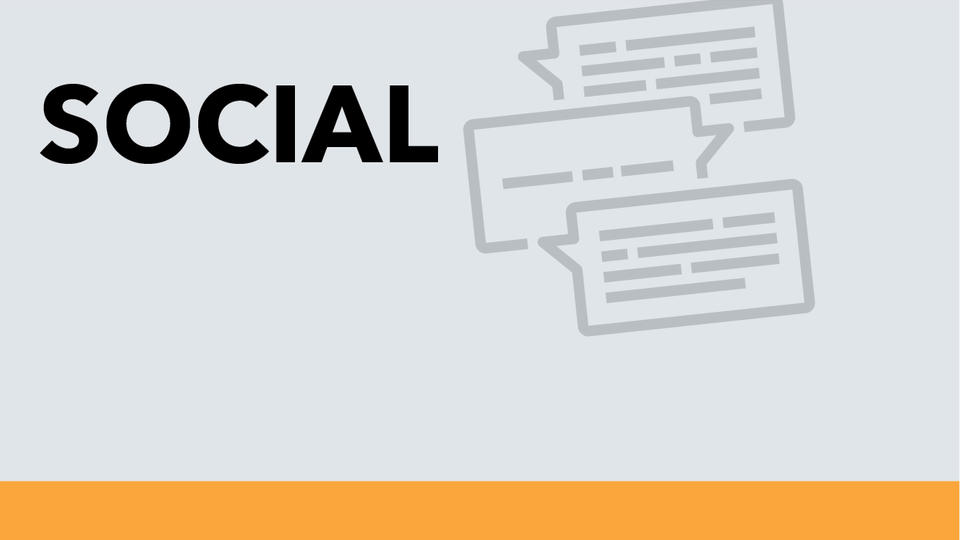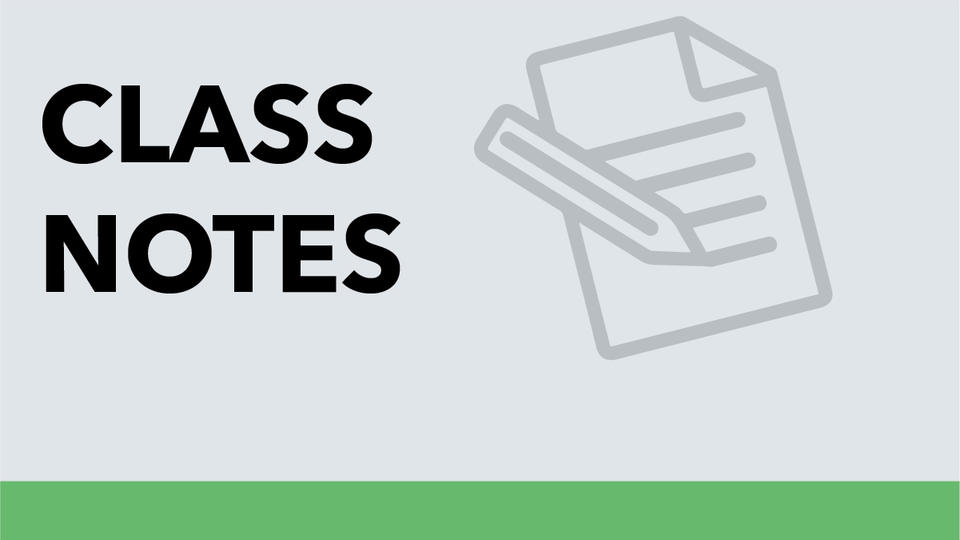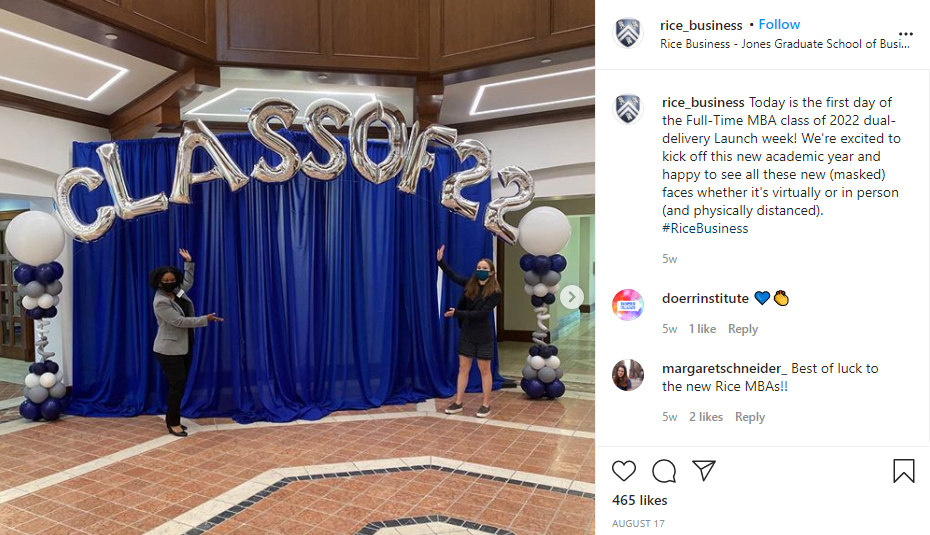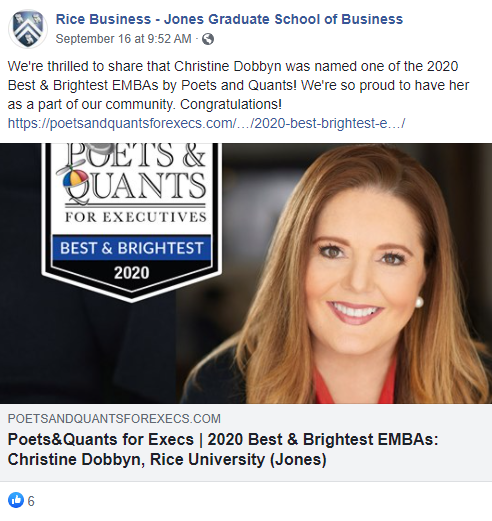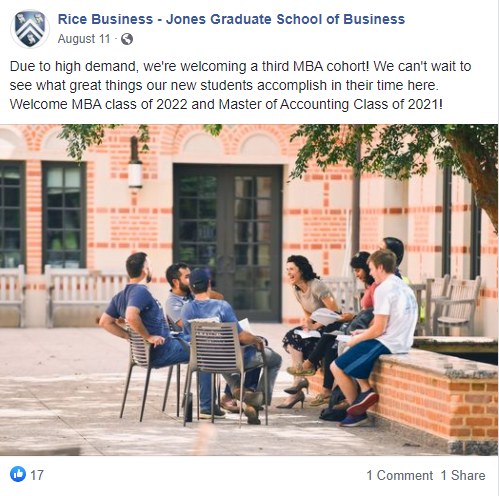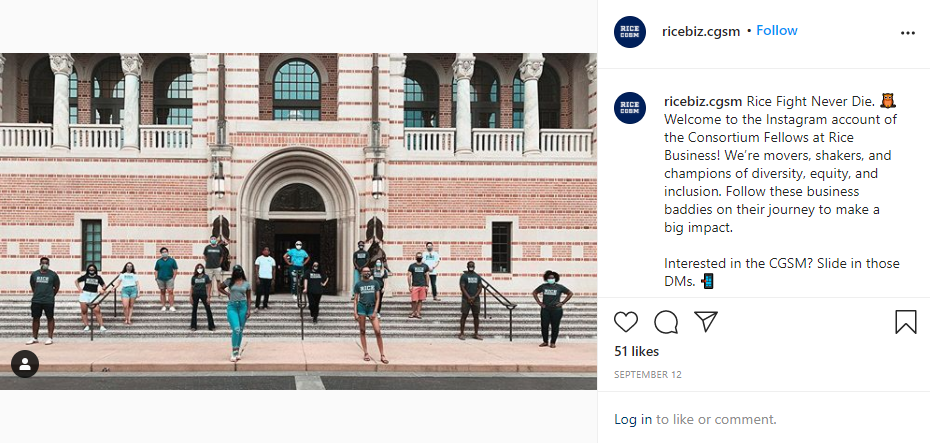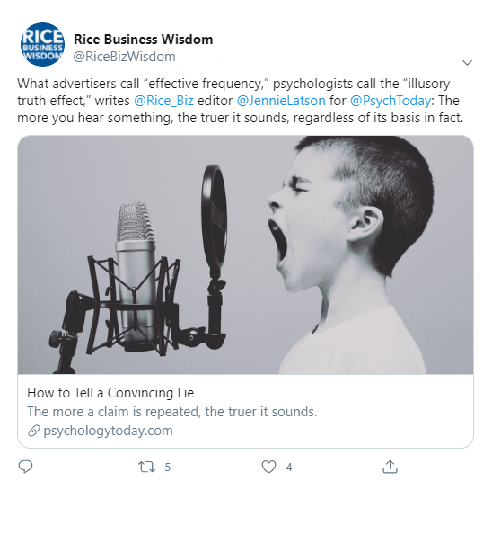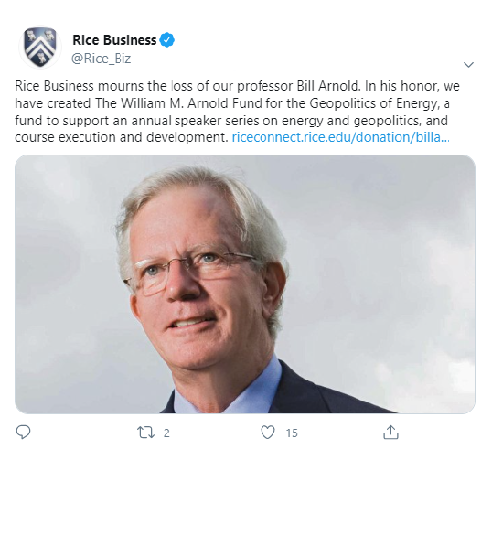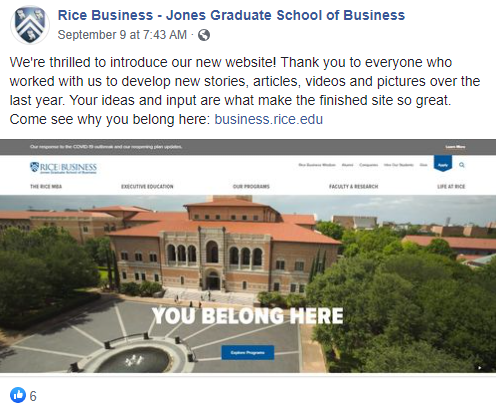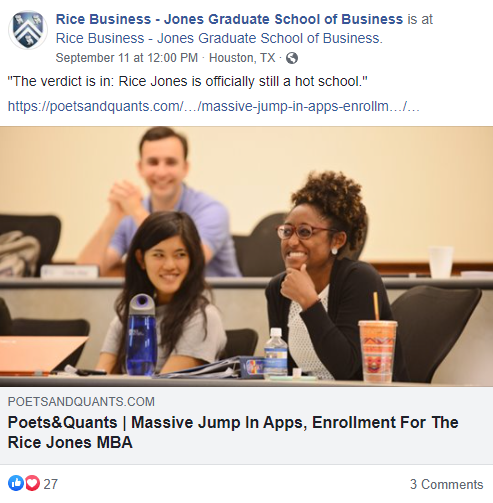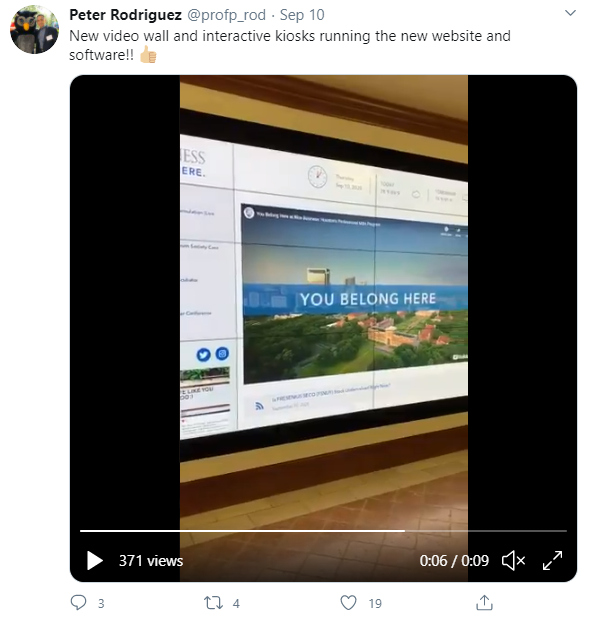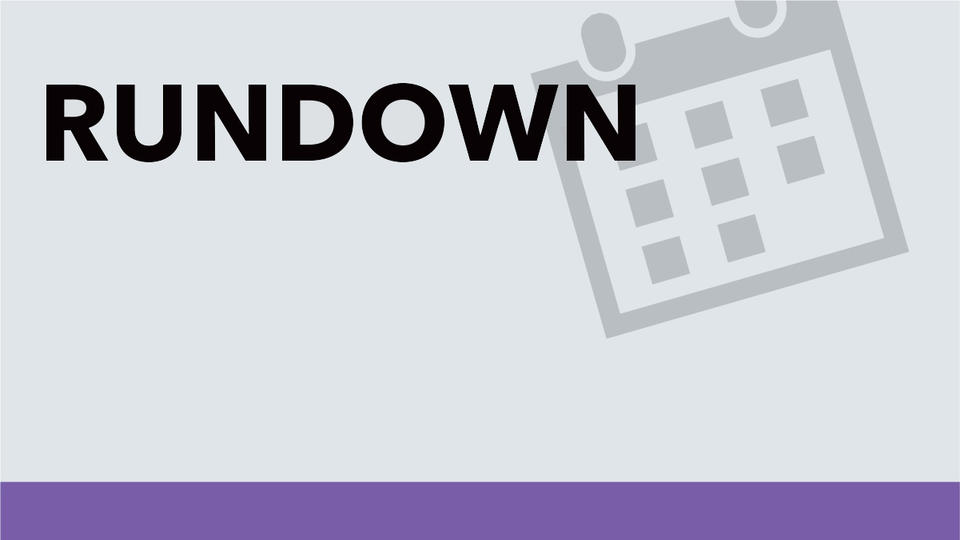Sqirl finds itself in a jam
Sqirl was internet famous for its house-made jams. Then a photo of mold made them internet infamous. Professor Anastasiya Zavyalova talked to Lauren Ober on the Spectacular Failures podcast about the best way to get out of this kind of reputational jam.
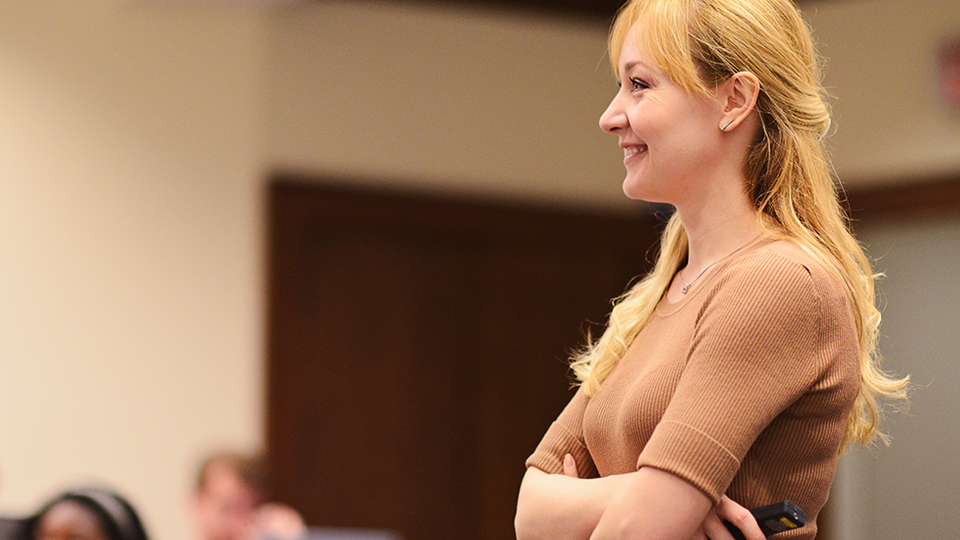
2020 First Generation MBAs: Casey Sherrod
"I applied at a few other universities but was sold when I came to campus for my interview. It was a close-knit, diverse, and unique school in a great city. I felt like I belonged there the moment I walked through the doors."
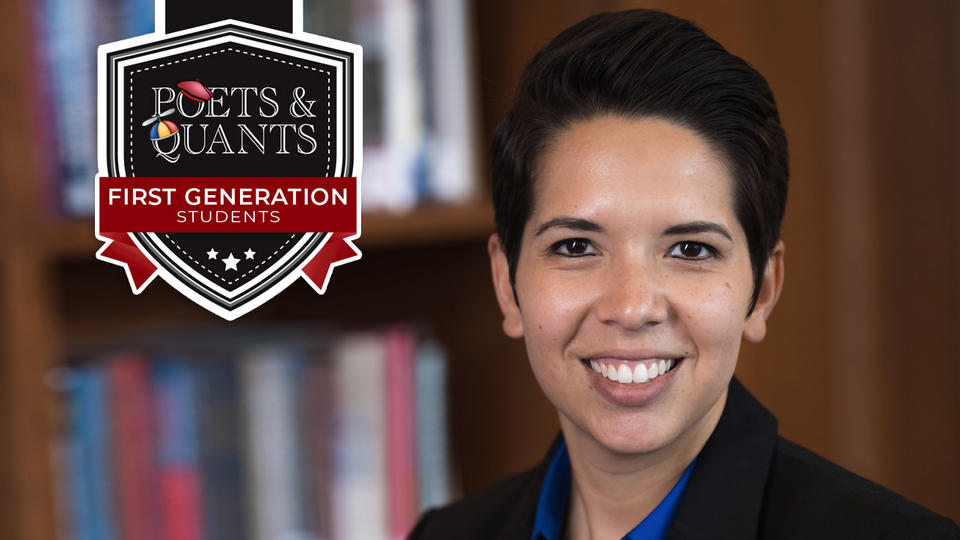
Why Is American Airlines So Infuriating?
With its industry reeling, the Fort Worth–based airline giant is quietly betting that diminished competition will keep passengers coming. Anastasiya Zavyalova, associate professor of strategic management, weighs in.

True Colors
How to be a good friend to your Black colleagues during traumatic times.


How to be a good friend to your Black colleagues during traumatic times
From 2015 to 2017, I worked for a high-profile startup in Marina del Rey, Calif., that prided itself on its social justice credentials. During those two years, Freddie Gray was killed by police in Baltimore. Alton Sterling was killed in Baton Rouge. Texas jurors refused to indict jail staff for Sandra Bland’s death and a police officer shot Philando Castile seven times in Minneapolis. It seemed as if the news reported the killings of unarmed Black women and men daily. But in my workplace, there was silence.
Every morning, I dragged myself out of bed, stuffed down the sadness and wondered if another lynching would be broadcast that day. Once in the office, I felt asphyxiated by a cloud of grief. Sometimes I’d discreetly head to the bathroom, lock the stall and cry. I wish our company had even once talked directly about the events traumatizing Black employees like me — and offered guidance to our coworkers on how to be a good workmate and friend. What could the company and my coworkers have said? The more advice you read, the more confused you may end up. It’s not simple.
Four hundred years of PTSD will not be undone with benevolence. We cannot heal from trauma until it ceases. But there’s a lot you can do to intercept it on behalf of your Black coworkers. The first step is simplest: Take action. Learn, vote, consider affiliating with a social justice group that can guide you through the issues. But what about the second step — supporting the people you see daily? How can you be a good friend to workmates doing everything they can to manage their grief while getting their jobs done?
To be Black in America, it’s been said, is to be African without memory and American without privilege. In particular, in many workplaces, African Americans are in a constant state of liminality — permanently suspended betwixt two cultural worlds. Former Rice Business professor Otilia Obodaru described the discomfort of this state in a paper, “Between and Betwixt Identities: Liminal Experience In Contemporary Careers.” Guiding figures and mentors can alleviate this stress of this ambiguous state, she noted. So can ride-or-die work friends. Unlike other peers, work friends have power to address structural and personal racism at the same time.
Politeness As A Survival Skill
While it may not always be obvious, African Americans constantly bend over backward to tame our Blackness to appear more “professional.” The effort can make the most mundane workdays grueling. Take everyday speech: While most of Black professionals would never use African American Vernacular English at work, we hear our white colleagues drop Black colloquialisms and be deemed “cool.” Most of us have heard or suffered disparagement or worse about Black hair worn naturally. So we subject our hair to harmful straightening treatments, wigs and weaves. Black colleagues, too, know from experience that if two or more of them congregate at the water cooler, some white coworkers will become extremely uncomfortable. So we keep our distance, sometimes not even acknowledging one another.
This workplace loneliness is sharpened by a racialized form of politeness many of us learned explicitly at home as a survival skill. Today, it’s part of modern interracial friendships that might seem to be intimate and relaxed. As Maryland opera singer Zyda Culpepper put it in this gentle, anguished video: “For a long time, I have been conditioned to believe that it is important not to make white people uncomfortable. Especially those who were white liberals or white progressives. … And so for years I held my tongue if I experienced a microaggression.” Now, like many other Black people, Culpepper has resolved to speak up — even with good friends and our friendly colleagues. To be a true friend, take a deep breath — and listen.
But the truth is, there are no easy answers. Resources telling how to behave within a moment we’ve never experienced before are conflicting. Chad Sanders, for example, wrote in the New York Times that he doesn’t need non-Black friends to send “love” texts. He’d rather you fight anti-Blackness amongst yourselves. To avoid being drained of his time and energy, he avoids communicating with his well-meaning non-Black friends altogether.
My sister April sees it differently. She works in retail and is often the only Black person within her professional and social circles. Among friends, she says, her feelings are dismissed, making her liminality particularly acute. Her knee-jerk reaction is to act as if everything is fine. But what she wishes, she told me, is for coworkers to ask her how she is doing and if her family is OK. While this is the opposite of what Sanders’ New York Times piece advises, it resonates for me too.
One thing Sanders absolutely hit the mark on, however: Don’t make it about you. My friend works in the public transportation sector, where employees are not permitted to discuss current events at the office. But he does hang out with a couple of non-Black colleagues outside work and says he’s glad to talk about politics with them. “Just be respectful!” he advises. Most importantly, he says, listen carefully, and think first about what you say. Saying, “I wish my great-grandfather hadn’t owned slaves,” comes off more about your feelings than those of your listener.
Show Warmth – And Real Professional Support
Looking back on my experience in California, how would I have suggested my non-Black colleagues behave? In addition to kindness, would I have wanted them to broach the subject of police brutality at work? Honestly, no. To ask me about such a delicate subject would undo the glue of my mask and send its glitter scattering into shallow air.
Instead, I would have wanted them to show warmth and active professional support during the workday. While I don’t want to talk about the trauma of watching a murder in a staff meeting, I would’ve appreciated an after-work call or email, admitting ignorance about the perfect thing to say, and asking honest questions about how I’m doing.
Above all I would have wanted my company leadership to acknowledge the public tragedies wounding their own Black workers every day — and to foster a culture where friends knew how to support each other, or could learn how.
In most ways, being a good friend to your Black colleague during a time of trauma is no different than being a good friend, period. Even so, technology, scholarship and a changing national culture have shown many Americans not only the effects of structural racism — but of the racial aggressions that take place even between people who genuinely care about each other. From my own experience, as a high performer in a workplace where I was often weeping inside, I can tell you that if you work to be a reliable friend, and you listen actively even when you hear things that surprise you, your Black colleague will feel your genuineness. We are all learning what to say and how to behave in the new America attempting to rise from the ashes.
How To Be A Good Friend
So, how can you be a good friend to your Black colleague(s) during this unprecedented moment? As a Black woman who has worked in corporate and government spaces for over 20 years, from coast to coast, I offer these suggestions:
- Share a kind word, genuine smile and greeting. Warmth goes a long way.
- When you make a kitchen run for snacks and beverages, ask us if we’d like something too. Food and drink bond people and show love.
- When you hear someone make an inappropriate or inaccurate statement about your Black coworker, speak up. It’s what any friend would do. But for a Black colleague the practical results can be momentous.
- Invite us to lunch or share food from home.
- Give us the inside scoop on what’s happening in the company especially when it has the potential to affect our careers.
- Encourage us to apply for open positions we would be perfect for.
- Embolden us to take advantage of company sponsored mental health benefits.
- Pick up the slack when you see that we are overwhelmed with responsibility and/or grief.
- Send funny memes for a good laugh.
- Give us space when we need it.
- Commit to becoming a lifelong learner about the pernicious effects and causes of racism.
Toddré Monier is a multi-hyphenate creative and freelance contributor to Rice Business Wisdom. You can discover more about her at https://beautyisuniversal.com/
A version of this article appeared in the Houston Chronicle.
Keep Exploring
Alumni Emmett, Parker and Gray to hold virtual discussion on upcoming elections
With Election Day just over a month away, Rice University’s School of Social Sciences and Department of Political Science are hosting a virtual discussion about the presidential, congressional, state and local contests. The panel includes former Houston Mayor Annise Parker ’78, who previously served as a professor in the practice at Rice Business.
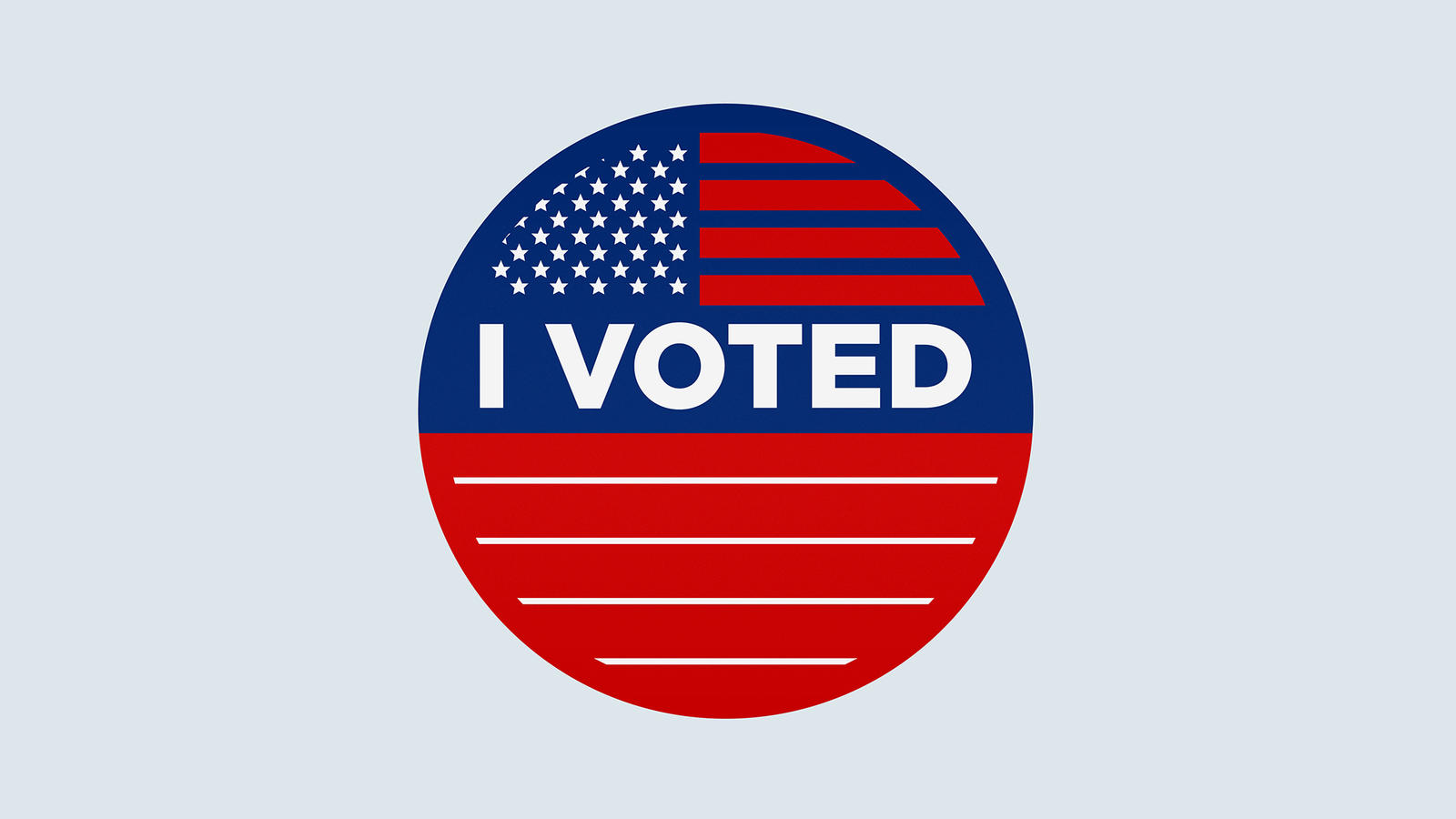
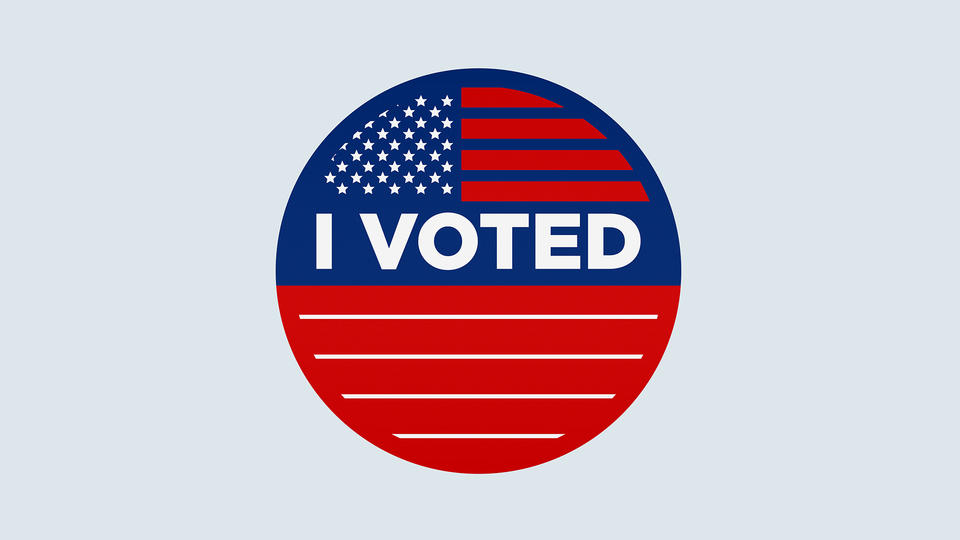
With Election Day just over a month away, Rice University’s School of Social Sciences and Department of Political Science are hosting a virtual discussion about the presidential, congressional, state and local contests.
Panelists for the Sept. 30 event include former Harris County Judge Ed Emmett ’71, a senior fellow at Rice’s Kinder Institute for Urban Research, fellow in energy and transportation at Rice’s Baker Institute for Public Policy and professor in the practice in Rice’s School of Social Sciences; former Houston Mayor Annise Parker ’78, who previously served as a professor in the practice at Rice’s School of Social Sciences and the Jones Graduate School of Business and was a fellow at the Doerr Institute for New Leaders; and Houston Chronicle reporter Lisa Gray ’88. They will examine the impending election and the far-reaching implications for Houston, Texas and the U.S. A Q&A session will follow the 7 p.m. discussion.
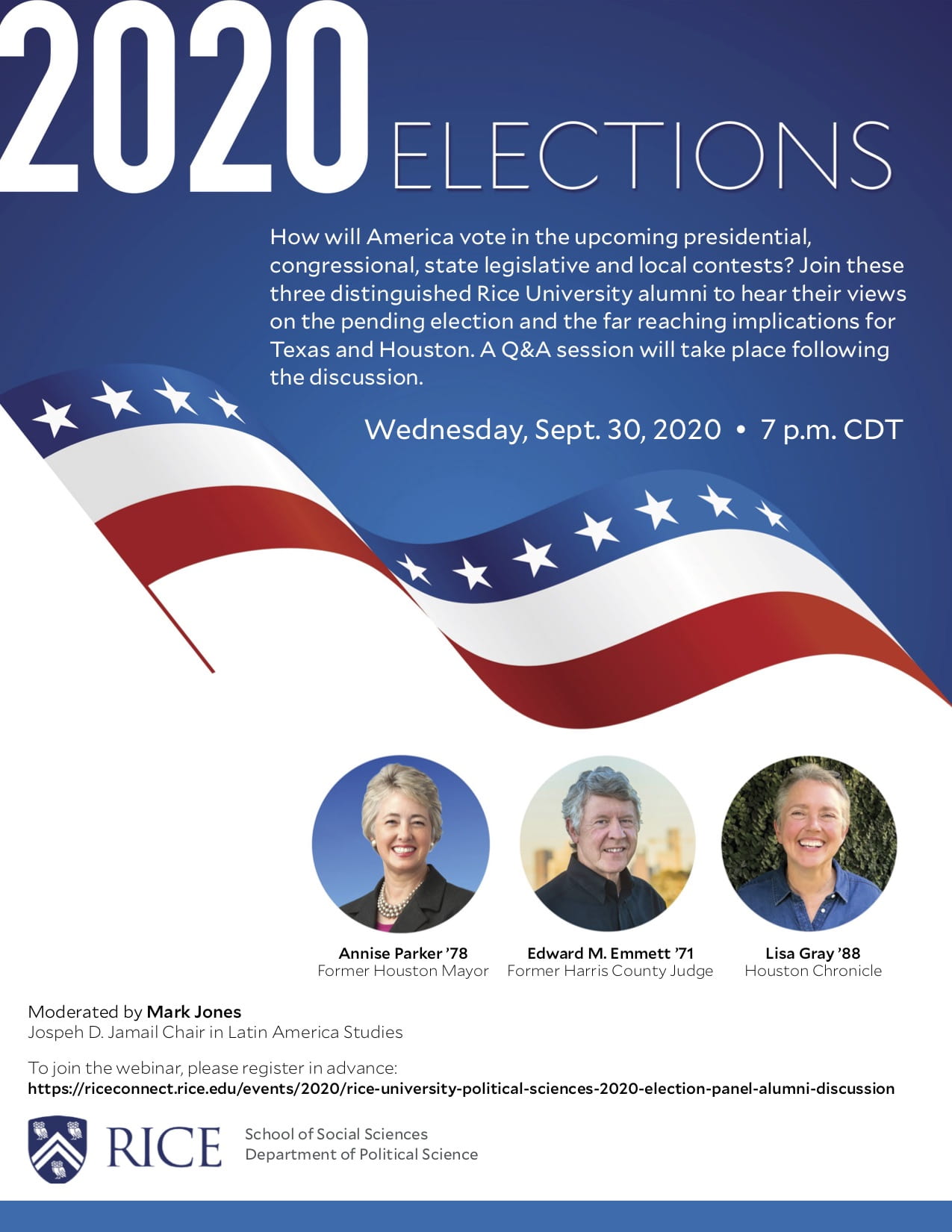 Amid the intensity of the presidential race, the 2020 general election will be the first in which Texans can’t vote a straight ticket.
Amid the intensity of the presidential race, the 2020 general election will be the first in which Texans can’t vote a straight ticket.
“While the attention is focused on presidential and national politics, I am interested in the impact of not having straight-ticket voting on local races,” Emmett said.
“Voters will have to choose one office after another, all the way down the long list of positions — including judges — that Texas puts on the ballot,” Gray added. “I’d like to think that’ll lead to a burst of civic engagement, in which voters carefully evaluate the candidates in each race. But c’mon: Will most Texans really do that?
“It’ll be fascinating to see what happens on those down-ballot races,” she said. “Will people stop voting when they get to the races they don’t know about? Will they just pick the R’s or the D’s all the way down the line? Will they vote for slates of candidates — Republican, Democrat and third-party — who advance whatever cause is dearest to their hearts? Or will we see an outbreak of voting based on which of the candidates’ names the voter likes best? I worry it’ll be that last option.”
The event will be moderated by Mark Jones, the Joseph D. Jamail Chair in Latin American Studies at Rice.
“We are pleased to be able to offer an opportunity for our community to learn more about what to expect from the 2020 elections and what this will mean for Houston and Texas in particular,” said Ashley Leeds, a professor of political science and the department chair. “We’re fortunate to have such distinguished alumni who are able and willing to provide their perspective.”
You May Also Like

Rice University’s Jesse H. Jones Graduate School of Business today announced the launch of its Graduate Certificate in Healthcare Management program, a 10-month, credit-bearing professional credential designed for current and aspiring leaders seeking deep expertise in the business of healthcare.
Breakdown
Why did we stop taking breaks when we started working remotely?


Why did we stop taking breaks when we started working remotely?
“You’re on mute” might be the Zoom quote of the year, but on Slack — at least around lunchtime — it seems to be: “Grabbing a quick bite.”
That was the daily refrain I heard from colleagues at Rice University’s Jones Graduate School of Business, where I edit the school’s alumni magazine, after we started working remotely in March. And while we were all very busy doing very important jobs, it’s not like we were developing a coronavirus vaccine. Was our work really so urgent that we couldn’t afford to take more than a few minutes for the mid-day meal? And why were we all “grabbing” our lunches? Were we afraid that if we loosened our grip, someone might snatch them out of our hands?
This is how downtime feels in general these days: snatched away. While working from home has eliminated our commutes and given us the freedom to work in our pajamas, it’s also blurred the lines between work and life — and deprived us of the ability to leave the office behind, physically and mentally. A May survey by the career website Monster found that half of remote workers said they were experiencing burnout, but roughly the same number weren’t planning to take any days off to decompress.
That’s a big mistake, says Charlotte Fritz, a professor of industrial and organizational psychology at Portland State University. For one thing, she says, working remotely during a global health crisis is not the same as working from home under normal circumstances. There are additional demands at home — like educating your kids, if you’re a parent — along with heightened anxieties.
Even when we’re not in the middle of a deadly pandemic, Fritz says it’s crucial to our wellbeing to attain what she and other researchers call “psychological detachment” from work. “By ‘psychological detachment,’ we mean mentally letting go of work when we leave the workplace,” she says. “Currently, some of us have overlap between the physical workspace and home, and it might make it a lot harder to detach.”
Detaching requires us to take breaks, whether they’re multiple-day vacations or short moments of meditation or relaxation during the day. But the health crisis itself is making it harder to take the downtime we need to deal with the stress it’s causing. Fewer of us are planning vacations because we don’t feel safe traveling. And the economic uncertainties of the pandemic are adding to a sense of pressure to be a perfect employee: highly productive and always on.
Remote workers tend to take fewer breaks in general, in or out of a pandemic, in part because we can’t demonstrate our work ethic in the same ways from home that we could in an office, explains Minjae Kim, an organizational behavior professor at Rice Business. “Because our interactions are so limited, we have fewer opportunities to prove our commitment and our value,” Kim says. “One way to do that is to show that we’re working overtime, or by staying on Zoom all the time.”
The latter is more common in Korea, where Kim has studied workplace behavior. The pressure to demonstrate your commitment to your company — your willingness to make sacrifices for the sake of the organization — is greater in Korean workplace culture, and the pandemic has magnified that, Kim says.
“Since the pandemic began, people are pressured to keep their camera on all the time, even if they’re not in a meeting,” he says. “It’s a little more of an extreme setting, where signaling commitment is more intense.”
The problem is that changes to our work culture — including the “always on” mentality many of us are feeling now — have a tendency to become ingrained even after the crisis that provoked them has passed. That could mean that remote work sticks around long after the pandemic subsides, which may be a good thing overall. But it could also mean that if we let our lunch breaks slip from our grasp now, we’ll never be able to grab hold of them again.
Lunch breaks play a particularly vital role when it comes to maintaining our mental stamina, says John P. Trougakos, an organizational behavior professor at the University of Toronto Scarborough. In an aptly titled study, “Lunch Breaks Unpacked,” Trougakos and his colleagues found that being able to disconnect from work at lunchtime, for an activity entirely of your own choosing, was linked to a reduction of fatigue at the end of the workday and improved employee performance and wellbeing.
“We have a fixed amount of mental energy, just like we do physical energy,” he says. “When you don’t have a break, you become less and less efficient, and it becomes more stressful. That stress accumulates throughout the day, and it’s emotionally exhausting. If it accumulates day after day, week after week, that’s how you get burnout.”
Assuming remote work does linger after the pandemic ends, we’re going to have to find ways to make it sustainable — without burning out the workforce, Trougakos says.
“Remote work can be a huge benefit for people. We tracked 500 Canadian workers at the start of the pandemic for 12 weeks, and 83 percent didn’t want to go back to the way things were. They were adamant that ‘the way things were’ wasn’t working either,” he says. “Most people preferred a hybrid system where they had the freedom to go in some days and they could work from home some days.”
Luckily, there are ways to make remote work more workable, Trougakos says. “If remote workers structure their day well, they can find extra time for breaks. They don’t have their commute time anymore; they can use that time to take a walk or get some exercise. They have, in theory, more flexibility to plan out their best productivity windows. That could mean if you’re a night owl, you might schedule a block of work in the evening. But that doesn’t mean work your full workday AND work the night shift.”
Managers, meanwhile, should be firm about their expectations for the quality of work being done — and flexible about when it happens, he says.
“Are your employees getting the things done that they need to get done in a high-quality way? Then leave them alone and give them the freedom to make their own schedule,” he says. “Managers need to create some time for their employees to go offline, not just at the end of the day but during the day. Lunch is lunch; maybe you encourage coffee breaks in the morning and afternoon. If you’re really progressive, build in a half-hour nap break at 2 p.m. and watch them come back energized and productive at the end of the day.”
Managers can also encourage employees to take more downtime just by assuring them that they are valued and that their jobs are not in jeopardy, Kim says. Without that pressure to prove themselves, workers not only breathe easier but also perform better. And over time, as the workforce becomes increasingly remote, expectations will adjust and we’ll likely come up with new ways to demonstrate our commitment to our work — while still finding time for a leisurely lunch.
“It has to be managed, though,” Trougakos says. “We plunged into the pandemic with no preparation, no planning and no structure. It was chaos in a lot of ways. Now employers are seeing that there’s only so long you can maintain a feverish pace. As we come to a realization of what the new normal is, there will be issues that come up that maybe we didn’t expect, and companies will need to adapt.”
Jennifer Latson is an editor at Rice Business and the author of “The Boy Who Loved Too Much,” a nonfiction book about a genetic disorder that is sometimes called the opposite of autism.
You May Also Like
Keep Exploring
Back To School
A new academic year looks different during a pandemic — but Rice Business students are taking it in stride.
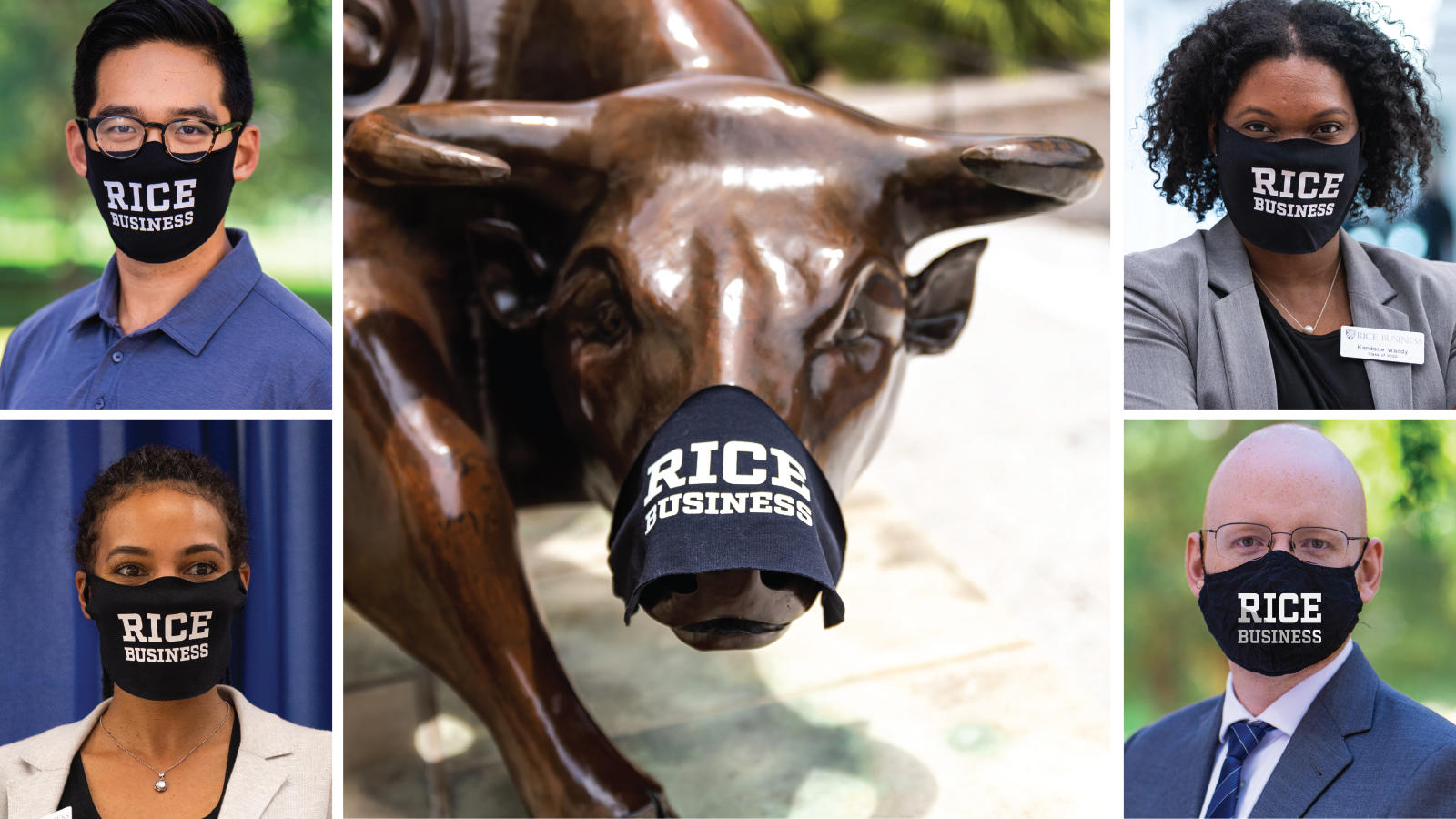
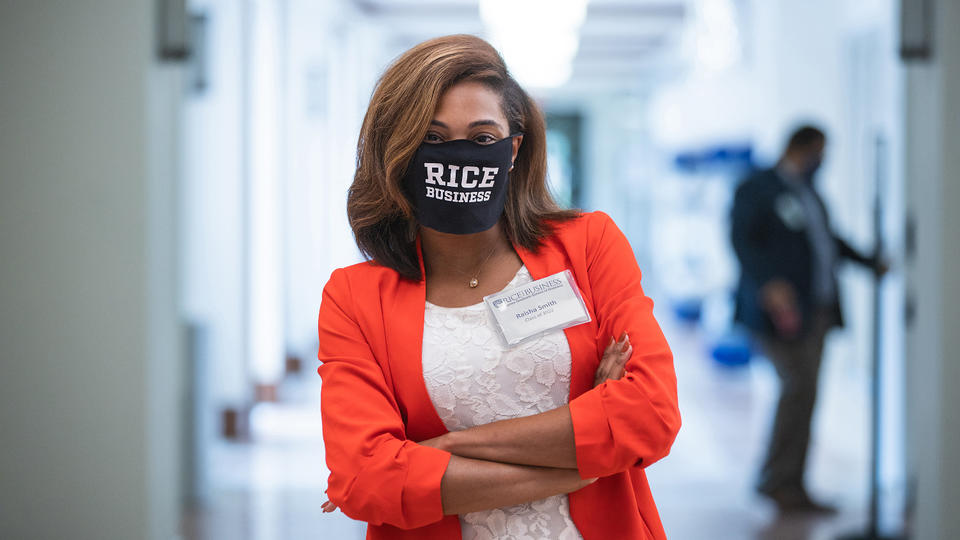
A new academic year looks different during a pandemic — but Rice Business students are taking it in stride.
One of the hardest things about adapting to the coronavirus pandemic is that you can never stop adapting. Guidelines change daily as new information emerges, new hotspots appear and expert advice evolves. As the new school year gets underway at Rice Business, we’ve been taking it day by day. But as part of this new normal, we’ve all become more adaptable — and we’ve come up with creative ways to achieve our educational goals.
After aligning with Rice University on timelines and guidelines, we submitted a reopening plan to the Crisis Management Team, and the approval included permission to run a few programs before the official Aug. 24 reopening date. In early August, new and returning students and professors sent us their preferences for in-person or remote learning, and we were able to accommodate 99.7% of students with some rotations. The degree program teams then hosted eight virtual student town halls to share safety protocols and answer questions. Finally it was go time.
On Aug. 24, to keep everyone physically distant, we began our dual-delivery fall courses, using new classroom technology that allows those streaming in from home and from a secondary classroom to be as much a part of the discussion as the students actually in the classroom with the professor.
Safety is our first priority. Everyone who comes to campus — including students, staff, faculty and visitors — is required to wear a face covering and expected to stay at least six feet from other people, indoors and outdoors. There are no more than 25 students in any classroom (see above for the dual delivery and second classroom set up) at any time, and larger gatherings are limited to no more than 50 people.
We’ve been lucky so far to avoid outbreaks like those that have hampered the return to campus at other schools. Part of the reason for that has been rigorous testing. Everyone who came to campus this fall was tested first, and Rice continues administer 1,000 PCR tests per day. Also known as molecular tests, these are the FDA gold-standard tests with the highest sensitivity (true positive rate) and specificity (true negative rate) for detecting an active coronavirus infection. As of mid-September, Rice had conducted nearly 19,000 tests with only 16 positive results — a positivity rate of less than 0.1 percent. (Testing results are updated regularly at coronavirus.rice.edu.)
Adjusting to the new normal has required some sacrifices, of course. In keeping with the CDC’s recommendation to avoid nonessential travel and Rice’s guidance against domestic and international travel, Rice Business made the tough decision to cancel all school-sponsored travel, such as career treks (Week on Wall Street, Seattle, Silicon Valley) and the travel component of global courses through the end of 2020. This included canceling the travel portion of the Global Field Experiences and Global Offsite Electives, although those courses are continuing as scheduled through a virtual platform. The semester exchange program was not canceled for students who had already received nominations.
All of these changes were the result of careful consideration (shout out to the Reopening Committee) and based on public health expertise with the goal of keeping everyone in our community healthy while preserving a rich and rewarding educational experience for students. In the big picture of this pandemic, they are the small sacrifices we can make to keep each other safe.
“This year has presented profound, serious and unique challenges to the way we work and to our health and safety. Our faculty, staff and students have wrestled with too many challenges and yet have shown impressive and unflagging resolve to best them,” says Dean Peter Rodriguez. “Remember that we’re in this together. The resilience and commitments I have seen from our community over the last few months makes me confident that together we will see it through and advance our school to new heights.”
You May Also Like
Keep Exploring
Newsfeed
Rice Business in the news.
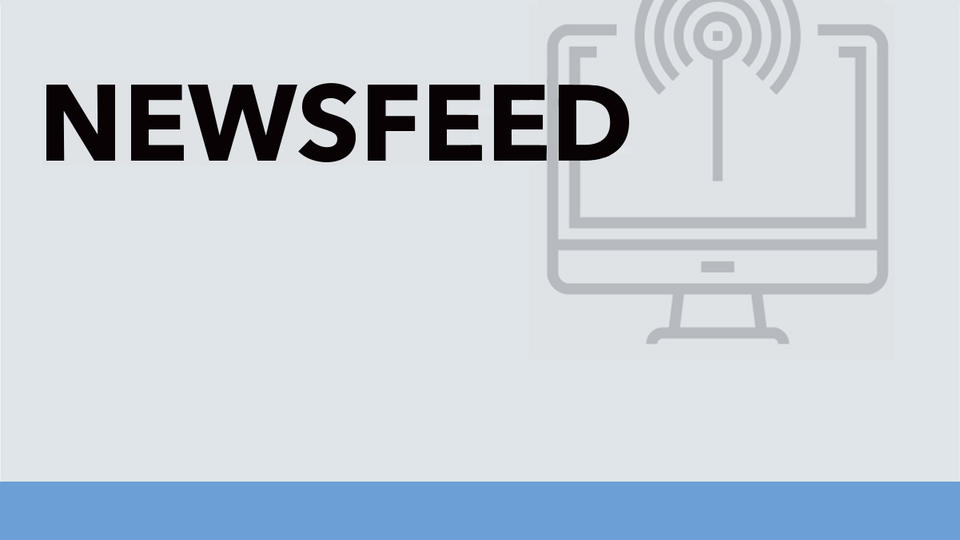
Rice Business in the news
Want a boss who keeps things interesting? Don’t work for a CEO named Jim, Bob, or Bill
Sept. 9, 2020
“This is consistent with findings from psychological research that successful professionals who have uncommon names tend to view themselves as more special, unique, interesting and creative,” write the [Rice Business] researchers.

What Is Cancel Culture?
July 27, 2020
“An individual act of canceling is psychological rejection. When it is communicated through social media and joined in by other individuals who feel the same way or are looking for an ‘outrage fix,’ canceling spreads like a contagion, amplifying the harm to the canceled entity,” writes Rice Business Professor Utpal Dholakia.

Debt Shakeout to Make Biggest Tech Firms, Retailers Even Bigger
June 9, 2020
Overall, the market share held by the top players has increased in more than 75% of U.S. industries during the past two decades, according to a 2018 paper by Rice Business Professor Gustavo Grullon and fellow researchers.

Economy shows fragile seeds of recovery sparked by stimulus, reopening
June 5, 2020
“I think (a recovery) could be choppy,” said Peter Rodriguez, an economist and dean of the Jones Graduate School of Business at Rice University. “We have a long way to go to get out of this.”
Read more of what Rice Business professors have to say in the media.
Keep Exploring
Seen on Social
The Rice MAcc Prepares You for Today’s Data-Driven Business World
The Rice MAcc continually revises its curriculum to ensure we provide our students a state-of-the-art education. We are excited to announce that, starting with this 2020-2021 academic year, we have introduced a sequence of data analytics courses to our curriculum
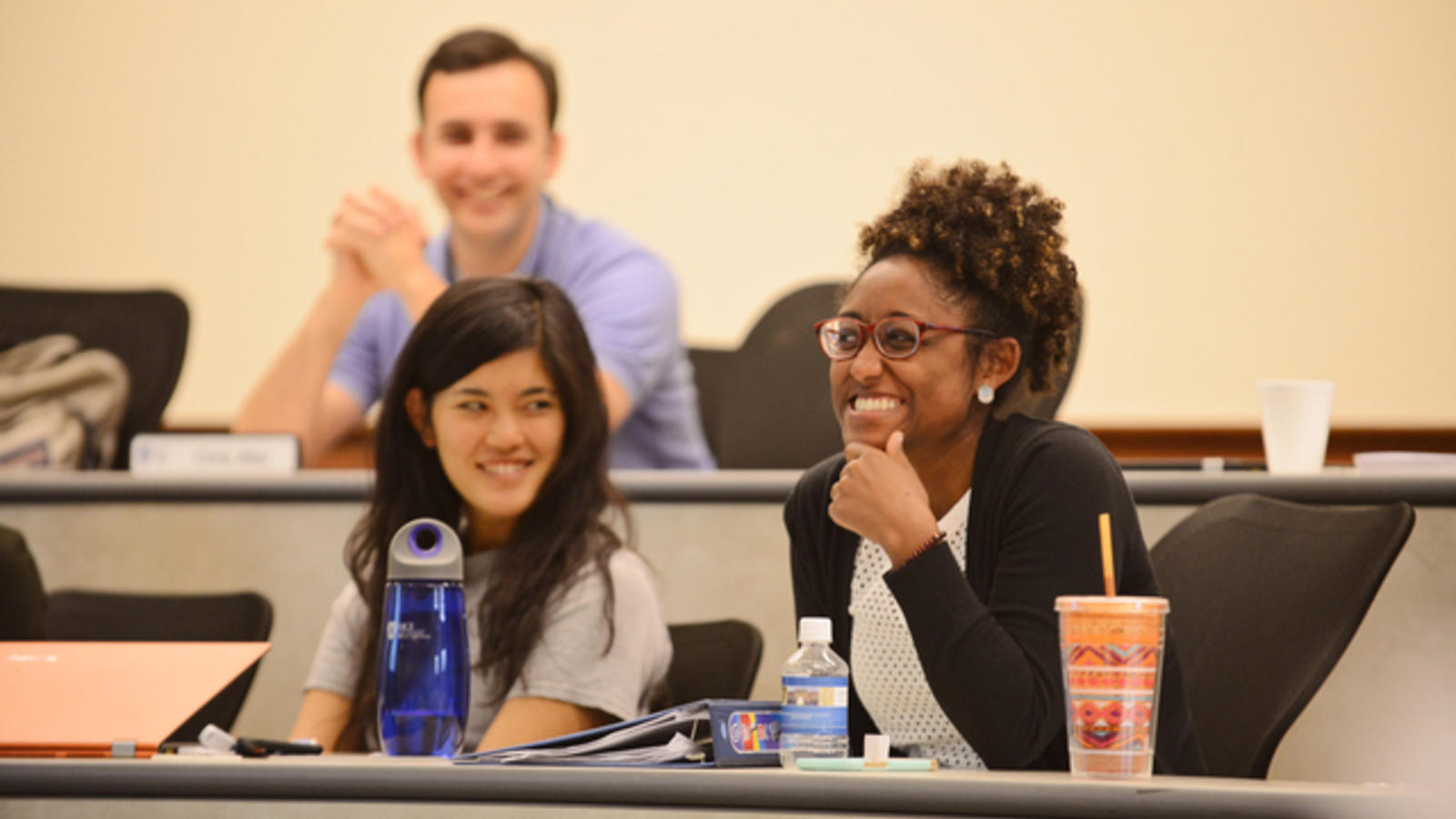
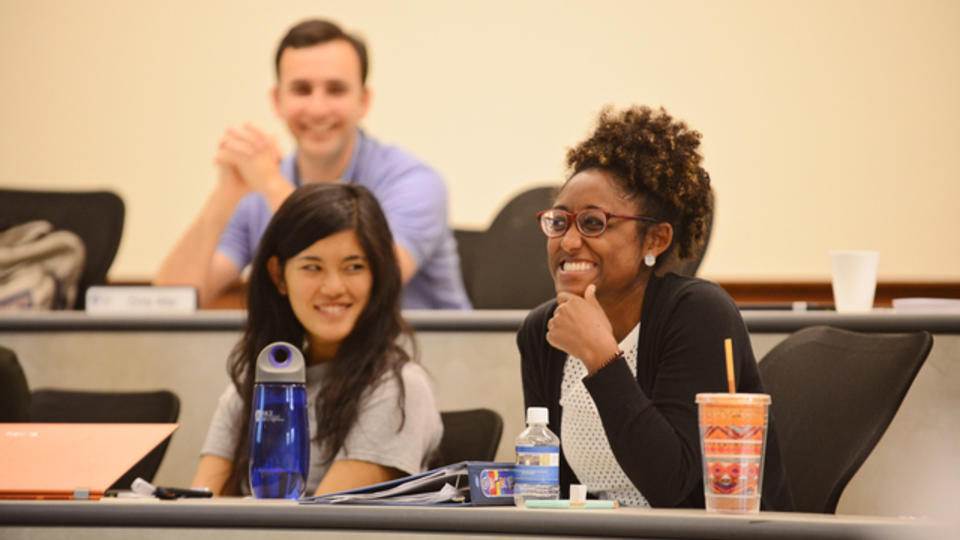
Our Rice MAcc curriculum now includes a sequence of data analytics courses.
As the Practice of Accounting Evolves, So Does the Rice MAcc Coursework
Since its ancient inception, accounting has been about collecting information, and then analyzing and distilling it into reports used for decision making. While that remains accounting’s function in society today, the amount of information available to be analyzed by accountants and auditors has exploded over the past 20 years. As a result, new accountants and auditors need to be adept in using “big data.”
The Rice MAcc continually revises its curriculum to ensure we provide our students a state-of-the-art education. We are excited to announce that, starting with this 2020-2021 academic year, we have introduced a sequence of data analytics courses to our curriculum: Data Analytics for Accountants I, Data Analytics for Accountants II, and Auditing: A Data Analytics Approach. These three courses equip our students with the quantitative education needed for our data-driven business environment. As a Rice MAcc student, you will learn to understand how data are structured, methodologies for cleaning and merging data, and advanced tools for analyzing and visualizing data. You’ll also develop computer coding capabilities to extract, organize, and analyze various types of structured and unstructured financial data.
You can review all the Rice MAcc coursework on our MAcc Curriculum page.
Our Program Is Now STEM Designated
Along with the new data analytics courses, we are proud to announce that the Rice MAcc program is now STEM designated. The STEM designation signals the quantitative orientation of our program.
Despite the quantitative aspects of the Rice MAcc, we appreciate that the profession of accounting is still very much a profession that involves working closely with others. The Rice MAcc puts an emphasis on developing students’ “soft skills” and professionalism. As a Rice MAcc student, you’ll hone your written and oral communication skills throughout your courses.
If our Master of Accounting sounds like something you’d like to be a part of, please reach out to us to learn more!
Interested in Rice Business?
Our Program Is Now STEM Designated
Along with the new data analytics courses, we are proud to announce that the Rice MAcc program is now STEM designated. The STEM designation signals the quantitative orientation of our program.
Despite the quantitative aspects of the Rice MAcc, we appreciate that the profession of accounting is still very much a profession that involves working closely with others. The Rice MAcc puts an emphasis on developing students’ “soft skills” and professionalism. As a Rice MAcc student, you’ll hone your written and oral communication skills throughout your courses.
If our Master of Accounting sounds like something you’d like to be a part of, please reach out to us to learn more!
